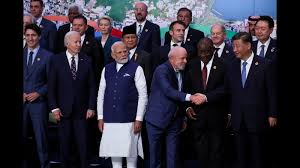How Minilateralism is Reshaping Global Order

- 09 Dec 2024
Introduction
Minilateralism refers to the growing trend of smaller, more focused international groupings of countries that cooperate on specific issues or regional challenges. It contrasts with the traditional multilateral frameworks, which are often large, slow-moving, and bogged down by lengthy debates and consensus-building. Today, minilateral platforms are increasingly driving global decision-making and shaping the future of international relations.
Rise of Minilateralism
Failure of Multilateralism
- Multilateralism's Decline: Traditional multilateral institutions like the United Nations (UN) are increasingly seen as ineffective due to their bureaucratic nature and the challenges in building consensus among a large number of diverse nations.
- Global Challenges: Emerging global issues, such as climate change, terrorism, and cybersecurity, require faster and more effective responses. The inability of multilateral platforms to address these challenges efficiently has led to a preference for smaller, more agile groupings.
Emergence of New Powers
- Multipolar World: The rise of new powers such as China, India, and Brazil has contributed to the formation of minilateral groupings. These rising powers desire a greater role in global governance but may not yet have the ability or desire to reshape the international order through large, cumbersome institutions.
- Minilateralism as "Multipolarity Lite": Minilateralism allows these countries to assert themselves as regional or global poles without the need for the complexities of full-scale multilateralism.
India's Role in Minilateralism
Strategic Positioning
- Geopolitical Context: India’s strategic location in South Asia, its status as part of the Global South, and its proximity to a rising China have all influenced its approach to minilateralism. India’s multi-aligned approach reflects its desire for flexibility in navigating the complex and shifting global geopolitical landscape.
- Diverse Partnerships: India is a key player in various minilateral arrangements, balancing its relationships with both traditional Western powers and rising Eastern nations, often serving as a bridge between competing geopolitical interests.
Minilateralism as a Solution
- Diversification Over Alignment: India's preference for minilateralism stems from the desire to avoid over-reliance on any single bloc or country. By engaging in multiple minilateral platforms, India seeks to hedge its interests, balancing its strategic objectives between competing global forces.
The Role of Minilateral Forums
Decision-making and Action
- Faster Action: Minilateral groupings facilitate quicker decision-making by bringing together like-minded countries to focus on specific issues, allowing for more decisive action than traditional multilateral bodies.
- Conflict Resolution: While minilateral platforms may not directly resolve conflicts, they offer indirect pathways for addressing geopolitical tensions by fostering dialogue and cooperation among countries with divergent interests.
Examples of Minilateral Groupings
- BRICS: The grouping of Brazil, Russia, India, China, and South Africa is an example of a minilateral arrangement where emerging powers cooperate on shared economic and political interests.
- Quad: The Quadrilateral Security Dialogue (comprising the United States, India, Japan, and Australia) is a prominent example of minilateralism focused on regional security, particularly in the Indo-Pacific region.
- Other Regional Groupings: Minilateralism also manifests in regional arrangements such as the ASEAN-led East Asia Summit or the India-Japan-Australia trilateral forum, each addressing specific regional and global concerns.
Conclusion
Shaping the Future of Global Order
Minilateralism is reshaping the international order by fostering closer, more flexible cooperation between countries on a wide range of issues. As multilateralism faces growing challenges, smaller, more focused partnerships offer a faster and more efficient means of addressing global problems. India's pivotal role in these groupings reflects its desire to navigate a complex geopolitical landscape while maintaining strategic autonomy. The rise of minilateralism marks a significant shift in global governance, one that could define the future of international relations.
